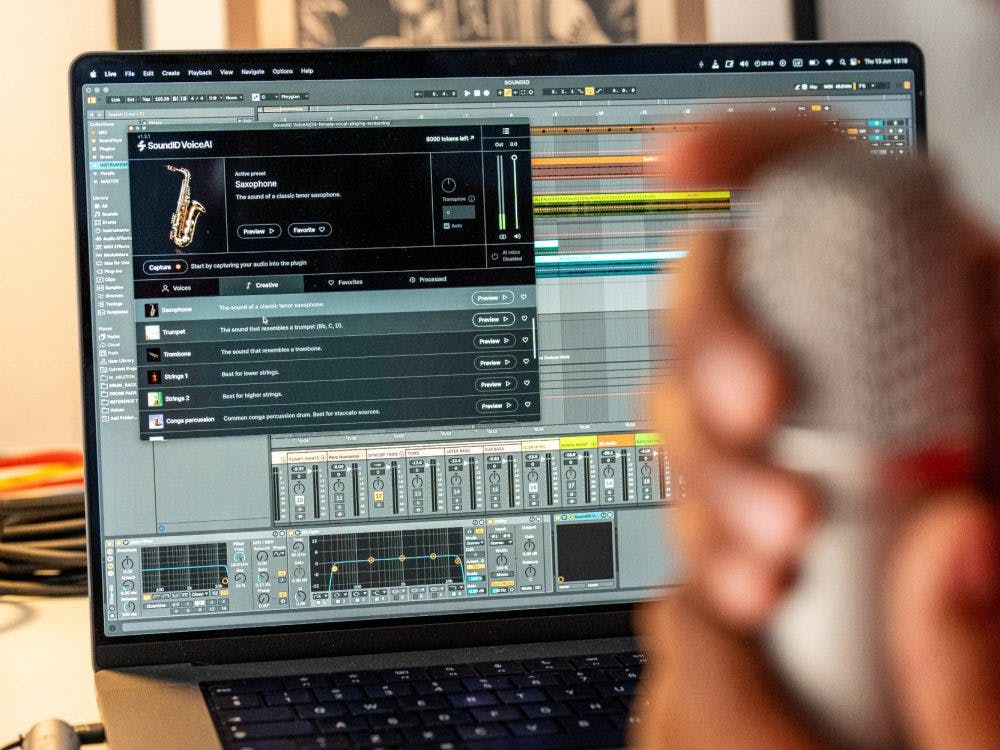Yes, AI can significantly free up time for artists to focus on emotional expression by automating technical tasks in music production. AI music production tools handle repetitive processes like mixing, mastering, and sound design, allowing musicians to dedicate more energy to songwriting, melody creation, and developing their artistic vision. This shift enables artists to spend less time on technical hurdles and more time on the creative elements that truly matter.
How AI is changing the way artists create music
The music industry is experiencing a fundamental shift as artificial intelligence for artists becomes increasingly sophisticated. Traditional music production workflows that once required extensive technical knowledge and countless hours of manual work are being streamlined through AI assistance.
Modern AI tools can now handle everything from generating backing vocals to transforming hummed melodies into full orchestral arrangements. This transformation means artists no longer need to master every technical aspect of production before they can bring their creative ideas to life.
The impact on musicians and producers is profound. Where artists once spent weeks learning complex mixing techniques or hiring expensive studio professionals, they can now focus their mental energy on what they do best: creating emotionally resonant music that connects with listeners.
What tasks can AI handle in music production?
AI excels at managing the technical backbone of music creation, taking over time-consuming processes that traditionally required specialised expertise. AI audio tools can now automate mixing assistance by balancing levels, applying EQ, and managing dynamics across tracks.
Mastering processes, which once required expensive professional services, can now be handled by AI algorithms that analyse your track and apply appropriate compression, limiting, and tonal adjustments. Sound design becomes accessible through AI-generated samples and textures that respond to your creative direction.
Drum programming transforms from a tedious process into an intuitive experience where AI can generate rhythmic patterns based on your genre preferences or even convert beatboxing into professional drum tracks. Basic arrangement work, including chord progressions and harmonic structures, can be suggested and refined through AI assistance.
How does AI help artists focus on creativity instead of technical work?
By automating repetitive technical tasks, AI creates space for artists to engage with the emotional core of their music. Creative expression in music flourishes when artists aren’t bogged down by the mechanics of production.
Instead of spending hours tweaking compressor settings or searching for the perfect drum sound, musicians can concentrate on crafting lyrics that tell compelling stories, developing melodies that evoke specific emotions, and building arrangements that support their artistic vision.
This shift allows for more intuitive music creation. Artists can hum a melody idea and instantly hear it transformed into different instruments, or record a single vocal line and generate rich backing harmonies within minutes. The creative flow remains uninterrupted by technical barriers.
What are the benefits of using AI for music workflow efficiency?
Music production efficiency improves dramatically when AI handles routine tasks. Artists can iterate on ideas faster, trying multiple arrangements or vocal treatments without the traditional time investment each variation would require.
New artists particularly benefit from reduced technical barriers. They can create professional-sounding demos without years of training in audio engineering, making music creation more accessible and democratic.
Faster iteration cycles mean more experimentation. When you can quickly test different vocal styles or instrumental arrangements, you’re more likely to discover unexpected creative directions that enhance the emotional impact of your music.
| Traditional Workflow | AI-Enhanced Workflow | Time Saved |
|---|---|---|
| Recording multiple backing vocalists | Generate backing vocals from single voice | Hours to days |
| Manual mixing and balancing | AI-assisted mixing suggestions | 2-4 hours per track |
| Searching for perfect samples | AI-generated custom sounds | 30-60 minutes per session |
| Professional mastering service | AI mastering algorithms | Days to weeks |
Can AI actually enhance emotional expression in music?
Rather than replacing emotional creativity, AI serves as a sophisticated creative partner that amplifies an artist’s expressive capabilities. AI songwriting tools can suggest chord progressions that match the emotional tone you’re aiming for, or provide vocal processing that enhances the feeling you want to convey.
Personalised sound recommendations help artists discover new textures and timbres that align with their unique style. AI can analyse your existing work and suggest complementary elements that maintain your artistic identity while expanding your sonic palette.
Intelligent arrangement suggestions adapt to your creative preferences over time, learning what works for your style and offering increasingly relevant ideas. This personalised approach means AI becomes more useful as it understands your artistic voice better.
What this means for the future of artistic expression
AI’s role as a creative partner represents a fundamental shift in how we think about music technology trends. The future isn’t about AI replacing human creativity, but about technology amplifying our capacity for emotional expression.
Artists who embrace AI tools while maintaining their authentic voice will likely find themselves with unprecedented creative freedom. The technology handles the technical heavy lifting, leaving more time and mental space for the deeply human aspects of music creation.
The key lies in viewing AI as a sophisticated instrument rather than a replacement for artistic vision. Just as electric guitars didn’t replace musicianship but opened new expressive possibilities, AI tools expand what’s possible while keeping human emotion at the centre of the creative process.
As these technologies continue evolving, we’re developing tools that understand and support artistic expression in increasingly nuanced ways. Our SoundID VoiceAI represents this philosophy, offering artists powerful vocal processing capabilities that enhance rather than overshadow their creative vision, helping musicians focus on what matters most: creating music that moves people.
If you’re ready to get started, check out our VoiceAI plugin today.



